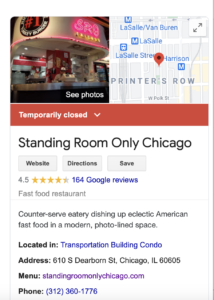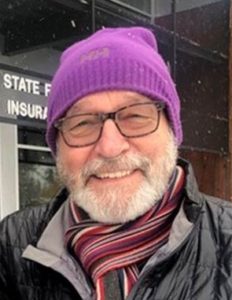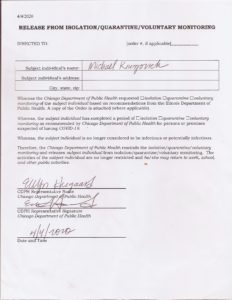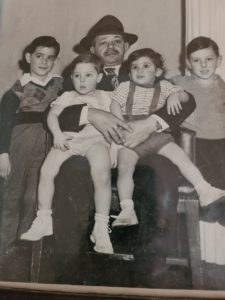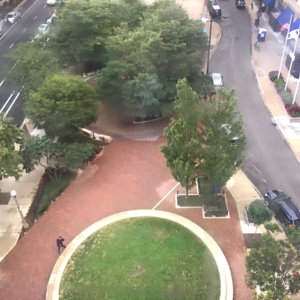Mondays with Mike: Missing turkey chili and a whole lot more
October 12, 2020 • 6 Comments • Posted in Mike Knezovich, Mondays with Mike, politicsThis past weekend in our Printers Row neighborhood was Chicago autumn at its most glorious. Radiant sun and chilly breezes all at once. There was less produce at our little farmers market, because you know, that’s how it goes here. People were out in droves, and except for masks, it felt a lot like last year at this time. In fact, if anything, it was more bustling. There are three businesses that weren’t here last year—a great little market called Totto’s (pronounced like Dorothy’s dog) on the corner of Polk and Dearborn , a pizza restaurant directly across the street from Totto’s, and a lovely little café named The Grail the middle of the block.
Sadly, there is one business missing. Standing Room Only (SRO) — a great little local fast food kind of place except it wasn’t that fast and it was really good — is gone. COVID shut it down for a while like it did other restaurants. But looting killed it.
SRO’s theme was Chicago sports, and it was drenched with Chicago sports memorabilia. I’d come down to order turkey chili or a Chicago style hot dog or a Greek salad and while I waited, I looked at jerseys and photos autographed by the likes Walter Peyton, Dick Butkus, Michael Jordan, Ernie Banks, Minnie Minoso and Frank Thomas.
Today, memorabilia is an industry. There are holographic stamps of authenticity, shows where you pay to get in line to get a signature, and well, I don’t really like it. I’ve been around long enough to know that the stuff in the owners’ collection was not purchased at such shows. The people who worked at SRO were salt of the earth, Hispanic, and neighborhood fixtures. The owners opened the place when the neighborhood was iffy and it was a big gamble.
SRO piped jazz through its speakers indoors and out, and it was a homing signal for Beth and her dogs. SRO sat right next to our building’s entrance, so Beth knew exactly where she was when she heard Miles or Thelonious or whoever playing.
On May 30th of this year, a George Floyd protest was exploited by lawless idiots who systematically looted lots of downtown businesses. SRO’s cash register was found in the next-door park, busted open. The memorabilia was either stolen or destroyed.
I was dismayed in the aftermath to hear apologists for the looters say that it wasn’t violence against a person, it was violence against property.
I call bullshit. Anyone who has operated a small business knows better. Those looters committed violence against SRO’s owners, employees, and customers. SRO and its employees were our neighbors. We miss them.
I’m not equating the cold-blooded murder of George Floyd to the looting of SRO. But if we can get out of our binary thinking, we’d see that not empathizing with businesses that suffered for the looting is exactly the kind of thing we’re trying to change.
Our neighbor Al Hippensteel generously publishes a local journal called the Dearborn Express. In a recent edition, he wrote about SRO. I couldn’t say it any better:
It appears by the sign on the window that Standing Room Only is gone for good. The looters tore its guts out. It’s one thing to break a window to steal a mass produced coat or cell phone. What they removed from SRO was love. Love of the game. The autographed memorabilia stolen from the popular eatery is irreplaceable. SRO withstood the down times that inevitably occur to a long standing business: the downsizing of the financial district, a big part of their draw. Restaurants closed after 911. Not SRO. The “Great Recession” laid claim to many struggling businesses. Not SRO.
Covid 19 was a setback to all restaurants. But it was the looting, the removal of the SRO persona that was the final out in the 9th inning. The final field goal attempt with no time left on the clock.
